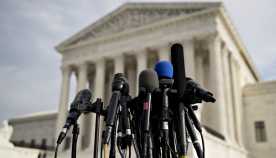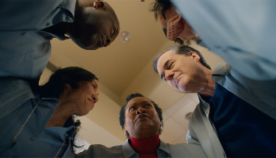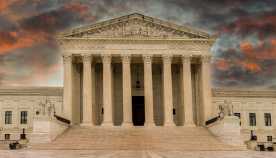In January 2016, Gorgi Talevski moved into Valparaiso Care and Rehabilitation (VCR), a state-run nursing facility in Indiana, because he needed help managing his dementia. Complaint and Demand for Jury Trial ¶¶ 8-9, Talevski ex rel. Talevski v. Health & Hosp. Corp., 19-CV-00013, 2020 WL 1472132 (N.D. Ind. Mar. 26, 2020). Soon after his arrival, his condition began to worsen. Id. ¶¶ 10-12. His family learned that Mr. Talevski had been given several psychotropic medications. Id. ¶ 14. In January 2017, the facility refused to readmit Mr. Talevski after a hospital visit, forcing him to move to a new facility much further away from his family. Id. ¶ 20. Mr. Talevski’s wife sued to enforce Mr. Talevski’s rights as a nursing facility resident, including his rights to be free from chemical restraints and involuntary transfer or discharge. Id. ¶¶ 2, 40.
In 1987, Congress passed the NHRA in order to protect and enhance nursing home residents’ quality of life. Congress enumerated “Residents’ rights,” which include the right of a resident to be free from physical or chemical restraints and the right to remain in a nursing facility free from involuntary discharge or transfer. 42 U.S.C. § 1396r(c)(1)(A)(ii), (c)(2)(a). The NHRA has several enforcement mechanisms but does not expressly authorize a private citizen to file a lawsuit when their rights are violated. See id. § 1396r(h)(enforcement process). However, the law does say that all remedies already available to residents under state and federal law remain available. Id. The NHRA is an amendment to the Medicaid program, which Congress passed pursuant to its power under the Spending Clause of the Constitution. Talevski ex rel. Talevski v. Health & Hosp. Corp., 6 F.4th 713, 716, 719 (7th Cir. 2021)
Under 42 U.S.C. § 1983, Congress empowered people to file a civil lawsuit when their federal statutory or constitutional rights have been violated by a state actor. See Talevski, 2020 WL 142132, at *1. In response to Talevski’s case, VCR argued that the lawsuit should be dismissed because the NHRA did not create federal rights that could be enforced. Id. The United States District Court for the Northern District of Indiana analyzed whether the NHRA confers federal rights by applying a three-part test set forth by the Supreme Court: (1) whether Congress intended to benefit the person suing; (2) whether the law is clear enough for a court to enforce it; and (3) whether the law clearly makes action by the state mandatory, as opposed to optional. Id. (internal quotation omitted) (applying Blessing v. Freestone, 520 U.S. 329, 340-41 (1997)).
The District Court held that the NHRA failed the Blessing test and, therefore, could not be enforced using § 1983. Id. at *4. It determined that, although the NHRA clearly benefits residents, the use of terms like “quality of life” and “well-being” made the NHRA too vague to constitute a clear indication of Congress’s intention to confer a private right of action. Id. at *3.
Ms. Talevski appealed to the Seventh Circuit Court of Appeals, which reversed the decision, holding that the NHRA conferred federal rights that could be enforced using § 1983. Talevski, 6 F.4th at 715. Specifically, the court found that Congress’s use of the word “rights” in the NHRA, identification of residents as the intended beneficiaries of the Act, clear and administrable directives of what activities nursing facilities can and cannot undertake, and use of mandatory terms, like “must,” indicated that the law confers individually enforceable federal rights. Id. at 718-20. In so holding, the Seventh Circuit agreed with the Third and Ninth Circuits, which had already found that the NHRA could be enforced using § 1983. Id. at 725-26. AARP and AARP Foundation, along with other nonprofit organizations, submitted an amicus brief in support of Mr. and Ms. Talevski, arguing for nursing home residents to be able to use § 1983 to enforce their rights against state-run facilities.
VCR petitioned the Supreme Court for certiorari, not only asking the Court to determine whether the NHRA creates federal rights that are privately enforceable under § 1983, but also whether any piece of legislation passed under the Spending Clause can do so. Petition for a Writ of Certiorari at i, Heath & Hosp. v. Talevski ex rel. Talevski, No. 21-806 (Nov. 23, 2021). A ruling for Petitioner on this broad question would require the Court to overturn its own precedent holding that Spending Clause legislation can create federal rights enforceable using § 1983. See Wilder v. Va. Hosp. Ass’n, 496 U.S. 498, 524 (1990).
WHAT’S AT STAKE























